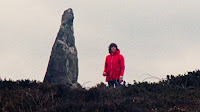This is a very Cornish film, but at least it was not produced in the Cornish language, which would have been a “performative” gimmick. Yet, in a way, it hardly would have mattered considering how little dialogue there is in this 16mm exercise in isolation and dread. The lonely landscape and Cornwall’s tragic history contribute to a woman’s descent into madness during the deliberate course of Mark Jenkin’s Enys Men, which opens Friday in New York.
We only know the woman as “The Volunteer,” who has come to the deserted isle of Enys Men (which translates to “Stone Island”) to observe the wildlife, particularly a patch of wildflowers. It is a methodical routine, with little variation, at least initially, but that appears to be what the Volunteer wants. At night, she still maintains her personal rituals, including reading A Blueprint for Survival, a 1970s environmental tract that may have directly contributed to her impending doom. Her only company comes from the occasional scheduled supply runs from the “Boatman,” who seems to mean more to her than a mere deliveryman.
Jenkins repeats this pattern over and over again, so the audience can pick up small deviations when they first start to develop. It begins with small lichen appearing on the Volunteer’s wildflowers. Then the fungi starts growing on her long-healed scar. Here and there, we see ever-so brief flashes of visions or hallucinations, harkening back to the Bal Maidens and the isle’s long-deserted mines.
A pat description of Enys Men might be “experimental folk horror.” As a filmmaker, Jenkins clearly exhibits avant-garde and ethnographic sensibilities. The film has a remarkably vivid sense of place—nearly to the exclusion of everything else. Yet, he milks a palpable sense of mounting dread from the eerie standing stones and abandoned monuments, quite skillfully.
Nevertheless, we must be careful applying terms like “horror” to Enys Men. It is not the sort of film that a viewer can simply sit back and let it act upon them. Jenkins’ screening experience demands the audience’s full attention and counts on their susceptibility to suggestion. This is a painstakingly crafted film, but you really need to work with it.
Yet, it should be clear even from a cursory glance how carefully Jenkins (working as both director and cinematographer) frames his images. Frankly, the textural imperfections of his 16mm celluloid heightens the sense of mystery and perfectly suits the early 1970s setting. In its way, Enys Men also demonstrates just how destructive nature and environmentalism can be to those who are socially and psychologically isolated. Respectfully recommended for patrons of experimental cinema, Enys Men opens Friday (3/31) in New York, at the Village East.

